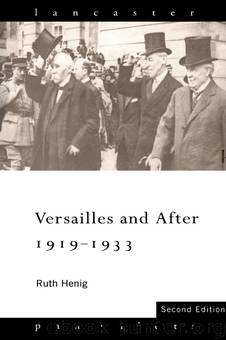Versailles and After, 1919-1933 by Henig Ruth;

Author:Henig, Ruth;
Language: eng
Format: epub
ISBN: 178306
Publisher: Routledge
Reparations and disarmament
Between January 1920 and December 1922, twenty-three summit conferences were held between French, British, Italian and Belgian representatives. They followed a similar and predictable pattern. British representatives urged their French colleagues to relax the provisions of the Treaty of Versailles, especially the reparations and disarmament clauses. The French consented to minor concessions, but only on condition that, if Germany defaulted on the agreed reparations or disarmament terms, Britain would support allied occupation of German territory to secure German compliance. On two occasions, in 1920 and 1921, the result was a French occupation of German towns in the Ruhr, which Britain endorsed with the utmost reluctance. In April 1921, the Reparations Commission set Germany’s total liability at £6000 million, but the German government remained extremely reluctant to pay. At the same time, members of the allied commissions of control, which were established to supervise the carrying out by Germany of the disarmament provisions of the Treaty of Versailles, reported numerous infringements and extreme disinclination on the part of the German authorities to co-operate with the commissioners or enforce compliance with the treaty terms.
French fears about Germany’s long-term intentions were intensified during the Genoa conference, held in March 1922 to discuss issues of European disarmament and economic rehabilitation. The German and Russian delegates slipped away to nearby Rapallo and concluded a secret treaty. News of their rendezvous spread quickly amongst the conference delegates, and was bound to engender suspicion and anxiety, particularly amongst those from eastern Europe. From this time onwards, rumours circulated about secret Russo-German collaboration to evade the terms of the peace treaties. Newspapers carried reports about the illegal German manufacture and testing of tanks and military aircraft on Russian soil, and about German loans to build up Russia’s armed strength. The possibility that Germany could collaborate closely with the Bolshevik regime in a challenge to the territorial settlement in Europe reinforced the determination of the British government to try to work with Germany for revision of the peace treaties, in order to wean her away from the malevolent influence of Russia. But the prospect of close Russo-German collaboration intensified feelings of insecurity in France and made her leaders more desperate to weaken Germany by any means possible.
In December 1922, the Reparations Commission declared Germany to be in default on deliveries of timber, though the British representative on the commission described the amount due as ‘almost microscopic’. Once more a military show of force was considered appropriate by France and Belgium to extract the reparations, and in January 1923 the Ruhr industrial area was invaded and occupied by French and Belgian troops. The French not only hoped to be able to collect the reparations at gunpoint but also wanted to try to fan the flames of Rhineland separatism, to see if there was any possibility of working towards the achievement of an independent Rhineland. Neither of these goals was achieved. Instead of a rising tide of support for Rhineland independence, the military invasion stirred up intense feelings of
Download
This site does not store any files on its server. We only index and link to content provided by other sites. Please contact the content providers to delete copyright contents if any and email us, we'll remove relevant links or contents immediately.
| Arms Control | Diplomacy |
| Security | Trades & Tariffs |
| Treaties | African |
| Asian | Australian & Oceanian |
| Canadian | Caribbean & Latin American |
| European | Middle Eastern |
| Russian & Former Soviet Union |
The Secret History by Donna Tartt(16617)
The Social Justice Warrior Handbook by Lisa De Pasquale(11489)
Thirteen Reasons Why by Jay Asher(7785)
This Is How You Lose Her by Junot Diaz(5764)
Weapons of Math Destruction by Cathy O'Neil(5034)
Zero to One by Peter Thiel(4823)
The Myth of the Strong Leader by Archie Brown(4789)
Promise Me, Dad by Joe Biden(4444)
Stone's Rules by Roger Stone(4415)
Beartown by Fredrik Backman(4411)
How Democracies Die by Steven Levitsky & Daniel Ziblatt(4396)
The Fire Next Time by James Baldwin(4340)
100 Deadly Skills by Clint Emerson(4075)
A Higher Loyalty: Truth, Lies, and Leadership by James Comey(4031)
Rise and Kill First by Ronen Bergman(4012)
The David Icke Guide to the Global Conspiracy (and how to end it) by David Icke(3880)
The Farm by Tom Rob Smith(3871)
Secrecy World by Jake Bernstein(3782)
The Doomsday Machine by Daniel Ellsberg(3730)
